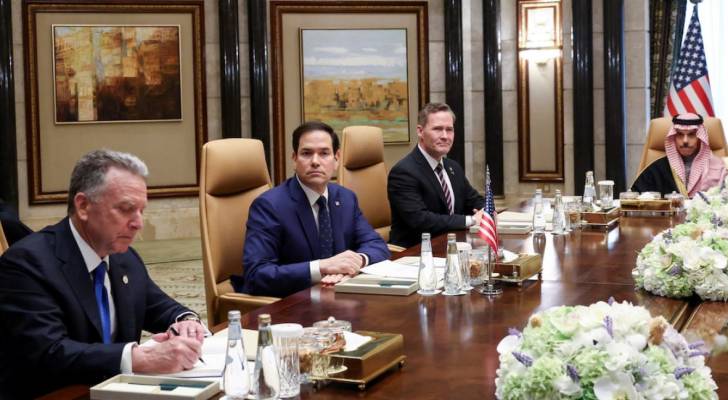Steve Witkoff, Marco Rubio, Mike Waltz, Prince Faisal bin Farhan Al-Saud (from left to right). (Photo: Reuters)
US-Russia peace talks in Riyadh: What we know so far
Senior officials from the United States and Russia convened in Riyadh on Tuesday for their first high-level discussions aimed at resolving the Ukraine conflict.
The meeting, mediated by Saudi officials, marks a significant diplomatic shift under US President Donald Trump, occurring less than a month after he took office.
The setting of the talks
The negotiations took place at Diriyah Palace, with Saudi Foreign Minister Prince Faisal bin Farhan Al-Saud and National Security Advisor Musaad Al Aiban overseeing mediation efforts. The US delegation was led by Secretary of State Marco Rubio, National Security Advisor Mike Waltz, and President Trump’s Special Envoy to the Middle East, Steve Witkoff.
Russia was represented by Foreign Minister Sergey Lavrov and Kremlin diplomatic advisor Yuri Ushakov.
Russian Foreign Ministry spokeswoman Maria Zakharova shared photos of both delegations inside the palace, emphasizing the significance of the meeting.
Key developments
- Trump’s Three-Stage Roadmap: According to German Member of the European Parliament Sergey Lagodinsky, Trump proposed a three-phase peace plan: a ceasefire, elections in Ukraine, and a final agreement. Lagodinsky claims this plan aligns with Russian President Vladimir Putin’s interests, alleging that Moscow hopes for a pro-Russia Ukrainian leader who would favorably negotiate key resources.
- EU Excluded from Future Talks: Russian Deputy Foreign Minister Aleksandr Grushko dismissed any EU involvement in negotiations, stating that if the bloc truly wanted peace, it should cease arms deliveries to Ukraine.
- European Leaders’ Concerns: The EU remains skeptical of a potential US-Russia deal. European Commission President Ursula von der Leyen assured US special envoy Keith Kellogg that the EU remains committed to supporting Ukraine’s independence and security.
- Mixed Reactions from European Nations: Germany has reportedly ruled out any EU peacekeeping mission without US involvement, while Poland’s Prime Minister Donald Tusk clarified that Warsaw will continue humanitarian and military aid but will not deploy troops. Conversely, UK Prime Minister Keir Starmer has indicated a willingness to contribute troops as part of post-ceasefire security guarantees for Kyiv.
- Moscow’s Stance: Russia insists that any settlement must address the “root causes” of the war, including Ukraine’s NATO aspirations and the alliance’s eastern expansion.
Economic, political implications
Under the Biden administration, the US supplied billions of dollars in military aid to Ukraine while imposing heavy sanctions on Russia. However, Moscow claims it has largely withstood these measures.
Kirill Dmitriev, head of Russia’s sovereign wealth fund, asserted that Western sanctions have caused substantial economic damage, including an estimated USD 300 billion loss for US businesses leaving Russia.
Musk’s endorsement of the talks
Founder of Tesla and owner of X Elon Musk welcomed the diplomatic move, sharing a Russian news segment about Lavrov’s arrival in Riyadh and commenting on X, “This is what competent leadership looks like.”
This is what competent leadership looks like https://t.co/frZrdhsEzZ
— Elon Musk (@elonmusk) February 17, 2025
Looking ahead
The outcome of the talks remains uncertain, but the meeting signifies a major shift in US foreign policy. With Trump prioritizing direct engagement with Moscow, European nations are left recalibrating their strategies. Trump’s envoy, Keith Kellogg, is expected to visit Kyiv on Wednesday, with further discussions likely in the coming weeks.




